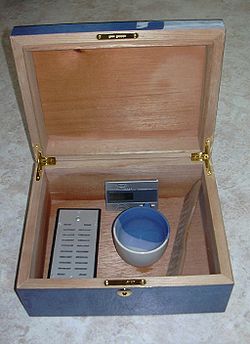Humidor


A humidor is any kind of box or room with constant humidity, and ideally temperature, used to store cigars, cigarettes, or pipe tobacco. For private use, small wooden or acrylic glass humidor boxes for a few dozen cigars are used, while cigar shops may have walk-in humidors, sometimes consisting of a whole floor. Humidors can be used to store other goods for which a certain level of humidity is desirable; the Colorado Rockies Major League Baseball team stores game balls in a large humidor at their home stadium, Coors Field, to counteract the effects of Denver's high altitude and generally low humidity on baseballs.
Despite the number of companies that sell humidors, many tobacco enthusiasts choose to make their own improvised humidors. Although they may not be up to the standards and lack the aesthetics of many commercially available humidors, they are still in wide use. Old jewelry boxes and tupperware containers are two common choices for those looking to create their own box.
Humidors of all sizes use hygrometers to keep track of the humidity levels.
Classification of humidors
Room humidor
Most common in cigar bars or stores. One room is built as or converted to a humidor where all the cigars are stored.
Cabinet humidor
Usually placed on the floor as a piece of furniture. Typically holds 1000-5000 cigars.
Personal humidor
Semi-regular cigar smokers will sometimes keep a small humidor in their homes for personal storage, special events, or aesthetic characteristics of the humidor itself . They are similar to travel humidors, though they can contain up to 75 or more cigars. This may also be known as a "Desktop Humidor".[citation needed]
Table humidor
Often quite heavy and though portable in theory, it's usually kept static in one location. Capacity ranges from three hundred to a few thousand cigars. Usually comes in polished wood exterior or marble or leather or combination of exotic elements, and glass tops.
Travel humidor
Portable and made for carrying cigars enough for the outing or event. Usual counts supported are 10 to 40 cigars.
Construction
Humidor cases are typically made of woodboard, although other materials, like acrylic glass and metal, are not uncommon. Carbon fiber has also been used. Disregarding aesthetic qualities, the casing's purpose is to protect the interior and create a closed environment, so any durable and airtight material can be used.
The interior is typically a veneer of Spanish-cedar wood or mahogany.
Spanish-cedar is the most frequently used wood for the interior veneer of humidors. It possesses the following desirable characteristics for cigar storage:
- It holds more moisture than most woods, so it helps maintain humidity.
- It imparts its aroma to cigars if they are stored in it for long enough. For the same reason, some cigars are wrapped in Spanish-cedar sheets before they are sold.
- Spanish-cedar wood can repel tobacco beetles. These pinhead-sized beetles can ruin entire stocks of cigars. They eat the tobacco and lay eggs, causing further infestation. They can also be discouraged by ensuring the humidor does not get hotter than 20 °C (68 °F).[1] The beetle eggs usually only hatch at around 25 °C (77 °F), although there are also instances where they will hatch at cooler temperatures if the humidity is too high.
- The wood properties are not prone to "warping" or "cupping" in high humidity.
Maintenance
The ideal humidity in a humidor is around 65-70% of relative humidity[2][3]; though it can go higher or lower depending on the cigar smokers preferences, it should never go higher than 75% due to the possibility of hatching tobacco beetles.The more empty space, the more readily the humidity level of the box will drop.
All humidors contain a humidifying system which keeps the air moist, which in turn keeps the cigars moist.
Most humidifying elements are sponge-like, passively releasing stored humidity through evaporation and diffusion. The use of a solution of propylene glycol and distilled water is recommended for replenishing the "sponge" as it has a buffer effect on air humidity, maintaining it at approximately 70%. Retailers and manufacturers claim it also has mild antifungal and antibacterial properties, though these properties wear off with the passage of time. In lack of propylene glycol, distilled water should be used, due to its lack of minerals, additives, or bacteria which keeps the contents neutral and healthy.
Electronic humidifiers are also available, relying on electronics to measure and regulate relative humidity.
Usage of silica gel beads is a third alternative. These also have a buffer effect on relative humidity, and are moistened with distilled water when necessary. They can absorb or release humidity within a certain range, and is typically calibrated in one of three ranges of humidity - 60%, 65%, or 70%. Unlike the sponge-like devices, silica beads only require distilled water, and can be ruined by propylene glycol.
Each humidor has to be seasoned after being bought or having been out of use for a while. [4] The seasoning process brings the wood inside the humidor close to the relative humidity level that it will be operating at. This is usually done by storing a small container of water or a soaked sponge in the humidor until the wood is sufficiently humidified. An unseasoned humidor will absorb humidity from the closed environment, which in turn will reduce the humidity of the cigars.
